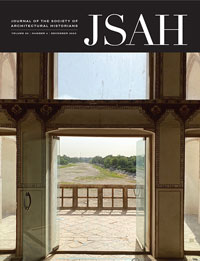Space and place operate within and against social and political forces like systems of land use, jurisprudence, market economies and hierarchical governance. This reality challenges designers, planners and historians to better understand and interpret the root causes of social disparities that are too often veiled by the apolitical language of formalist architectural theories and neoliberal models of urban development. In order to promote planning and design approaches that can address our most pressing needs and challenges, we must learn to ground new speculations in a nuanced interpretation of the cultural practices that embody the diverse sets of historical knowledge, creative abilities, and lived experiences contained within the Americas. This fellowship encourages an innovative consideration of the spatial histories of the Americas that are implicit in our diverse present.
The Land, Space and Identity in the Americas Fellowship offers a position to support the professional development of a scholar whose research or design work examines the changing relationship between social identity, placemaking and the built environment in the Americas, past, present or future. We are interested in innovative or activist approaches to design, research, and their histories that pluralize our understanding of the function of space in the built environment. Scholars engaged with research that establishes innovative global or transnational studies of spatial practices in the Americas are strongly encouraged to apply. The UTSOA has a long history of considering the role of design thinking in the Americas, from the establishment of its Center for American Architecture and Design (CAAD) to the sponsoring of study abroad programs, design studios and planning practicums in Latin America, and history seminars on American material culture. Additionally, our faculty and students are engaged in multiple ongoing research projects involving co-production and participatory methods grounded in the needs of various communities in the United States, Latin America, and beyond. This initiative continues these traditions.
Background
The University of Texas at Austin is one of the largest and most highly regarded public universities, situated in the 10th most populous city in the United States. The School of Architecture offers professionally accredited degree programs in Architecture, Interior Design, Landscape Architecture, and Community and Regional Planning, with post-professional and research degree programs in Sustainable Design, Urban Design, Historic Preservation, and Architectural History. In addition to the disciplines located within the School of Architecture, the university hosts programs, departments, and centers that engage in research related to this position.


